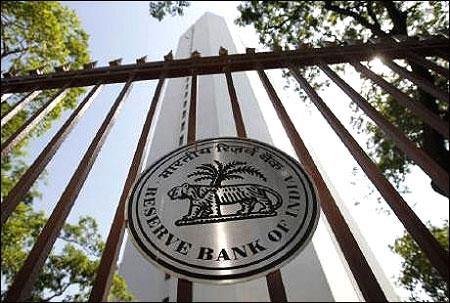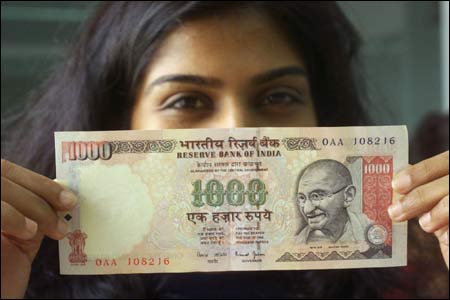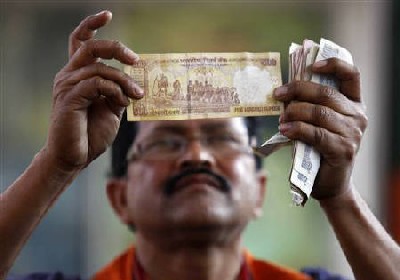Photographs: Reuters Business Standard
The rupee has been falling for months, losing 17.3 per cent of its value vis-a-vis the dollar since September. Many observers have come to believe that there is little reason to suppose that the rupee will recover before as late as March next year.
The Reserve Bank of India, meanwhile, insists its mandate is merely to minimise volatility in the foreign exchange market, and not to defend the value of the rupee.
While sensible in theory, in practice this is clearly beginning to show some flaws. A serious question needs to be raised: does this continuing precipitous decline reflect a sense taking hold in global markets that the rupee, the worst-performing currency in Asia this year, is a safe one-way bet?
The rupee market is still thin, and not invulnerable to speculative action.
. . .
Rupee fall: RBI must be seen to be in control
Photographs: Reuters
In the presence of one-way bets, speculation can create a vicious cycle, making a falling rupee a self-fulfilling prophecy.
The reason the RBI was given the mandate to manage volatility was that while the decision was taken, for the best of reasons, to allow the rupee to float, it was nevertheless known that a key purpose of regulation is to manage the impact that speculation can have on the real economy.
That producers are now feeling the pinch is obvious; while net exporters, like information technology firms, are happy, an extensive array of companies with foreign-currency borrowing are being hit, as are those globalised companies that import a good deal of their inputs.
No regulator should act merely to insulate market participants from the negative consequences of a business decision.
. . .
Rupee fall: RBI must be seen to be in control
Photographs: Reuters
But the purpose of regulation, in this case, is to ensure that markets function properly -- and for financial markets, that they do not dash off uncontrolled by a concern for fundamentals.
Yet, in its attitude to the rupee fall, the RBI has chosen to appear weak, a cardinal sin for a regulator. The belief is becoming universal that it could not affect or arrest a slide of significant proportions, even if it wished to; this further empowers speculators.
Statements like that from the chairman of the Prime Minister's Economic Advisory Council, C Rangarajan, indicating that the RBI is helpless, add to the damage.
The point of a well-functioning financial market is that participants should never be faced with a one-way bet.
. . .
Rupee fall: RBI must be seen to be in control
Photographs: Reuters
There is little chance, then, of prices -- in this case, the rupee exchange rate -- finding their true value. The RBI stayed out of the foreign exchange market for nine months, leading participants to believe that it was incapable of intervening.
Yet unless it does so occasionally, people will not be properly wary of taking positions, and insufficiently thoughtful about the positions they take.
Like inflation targeting, regulating a floating currency is all about managing expectations. The RBI cannot manage expectations if it appears helpless.
The game is psychological; it must be prepared to play the game well. And to play the game well, it has to show that it's willing to play the cards it has.






article